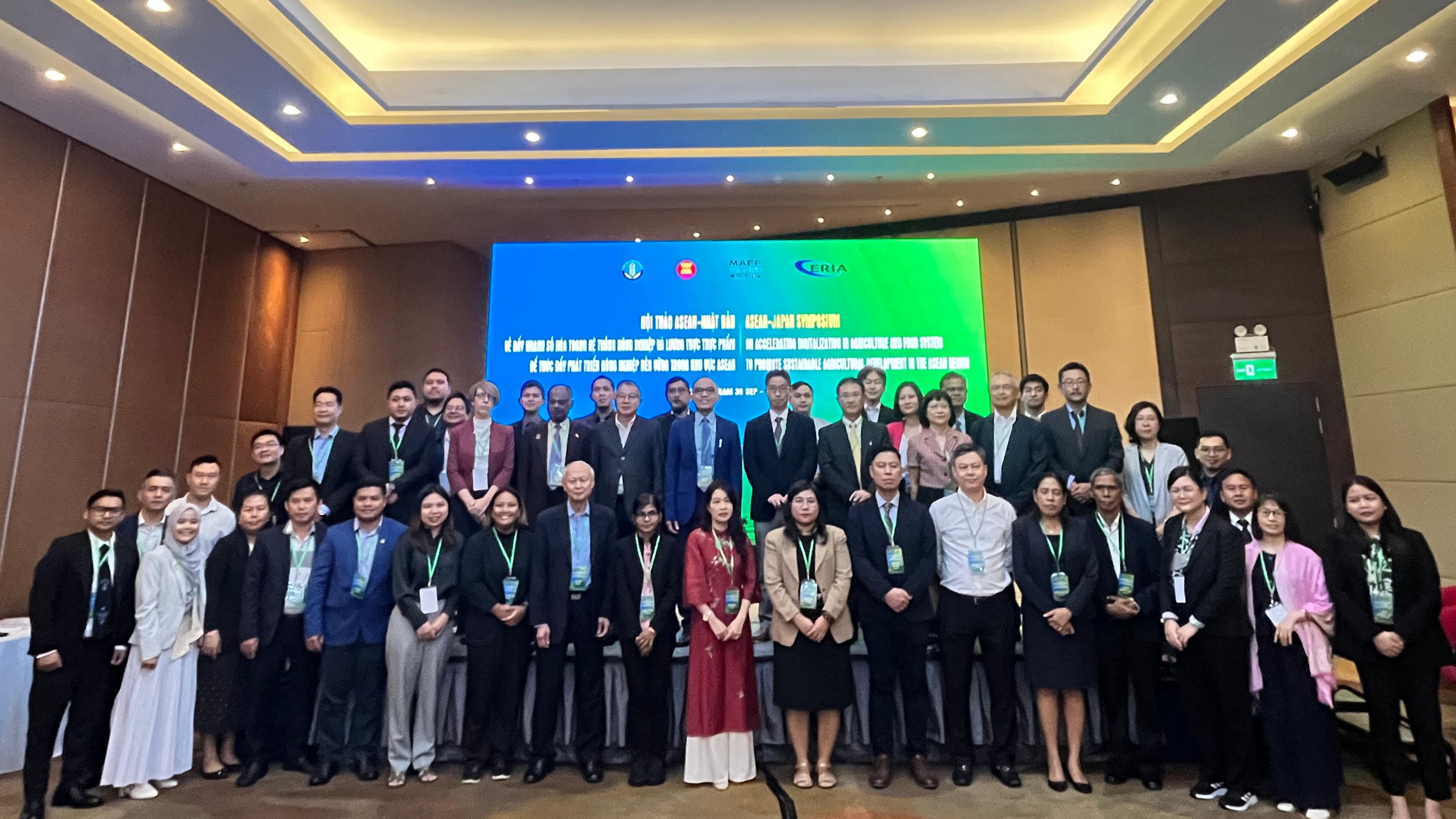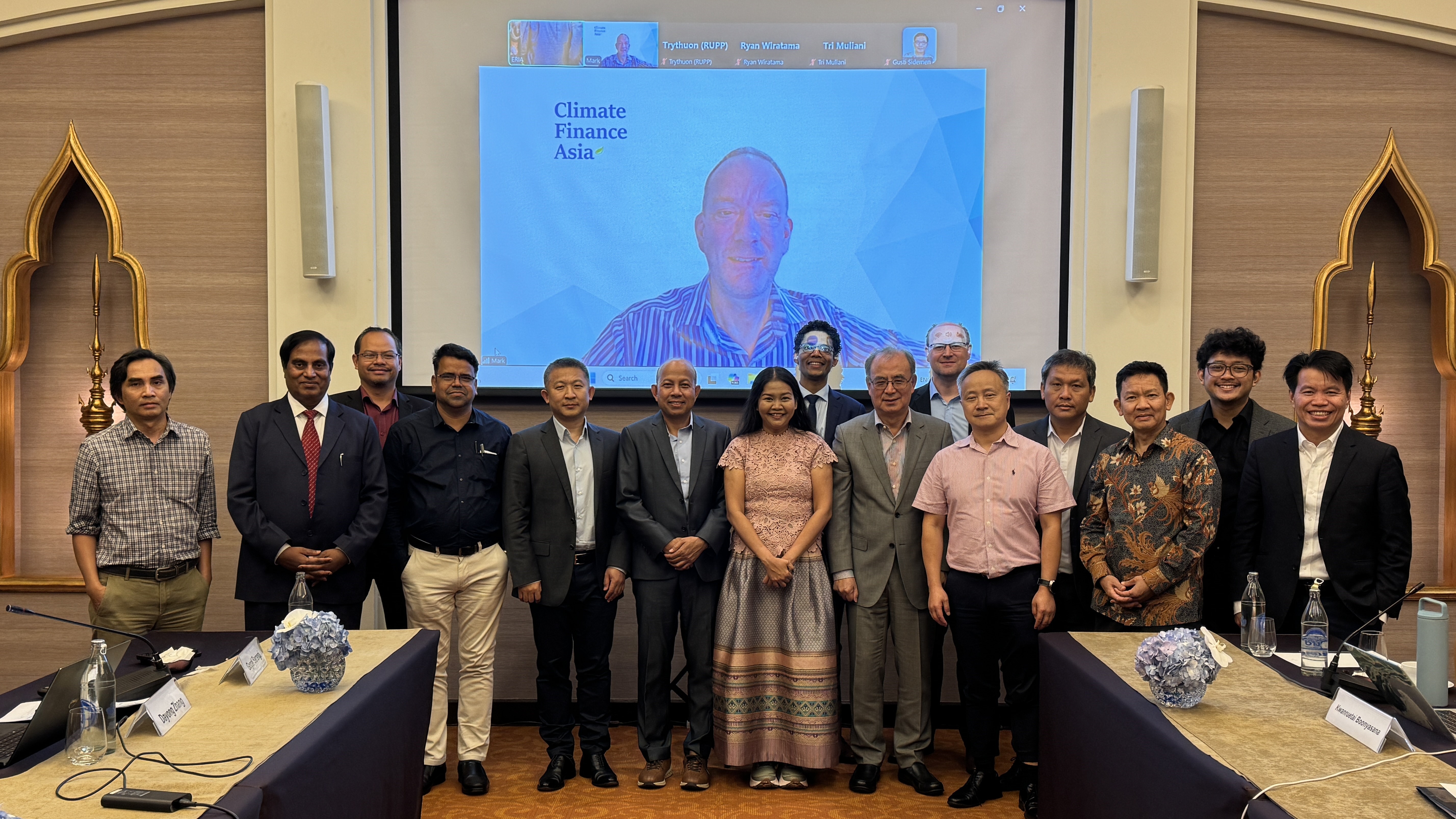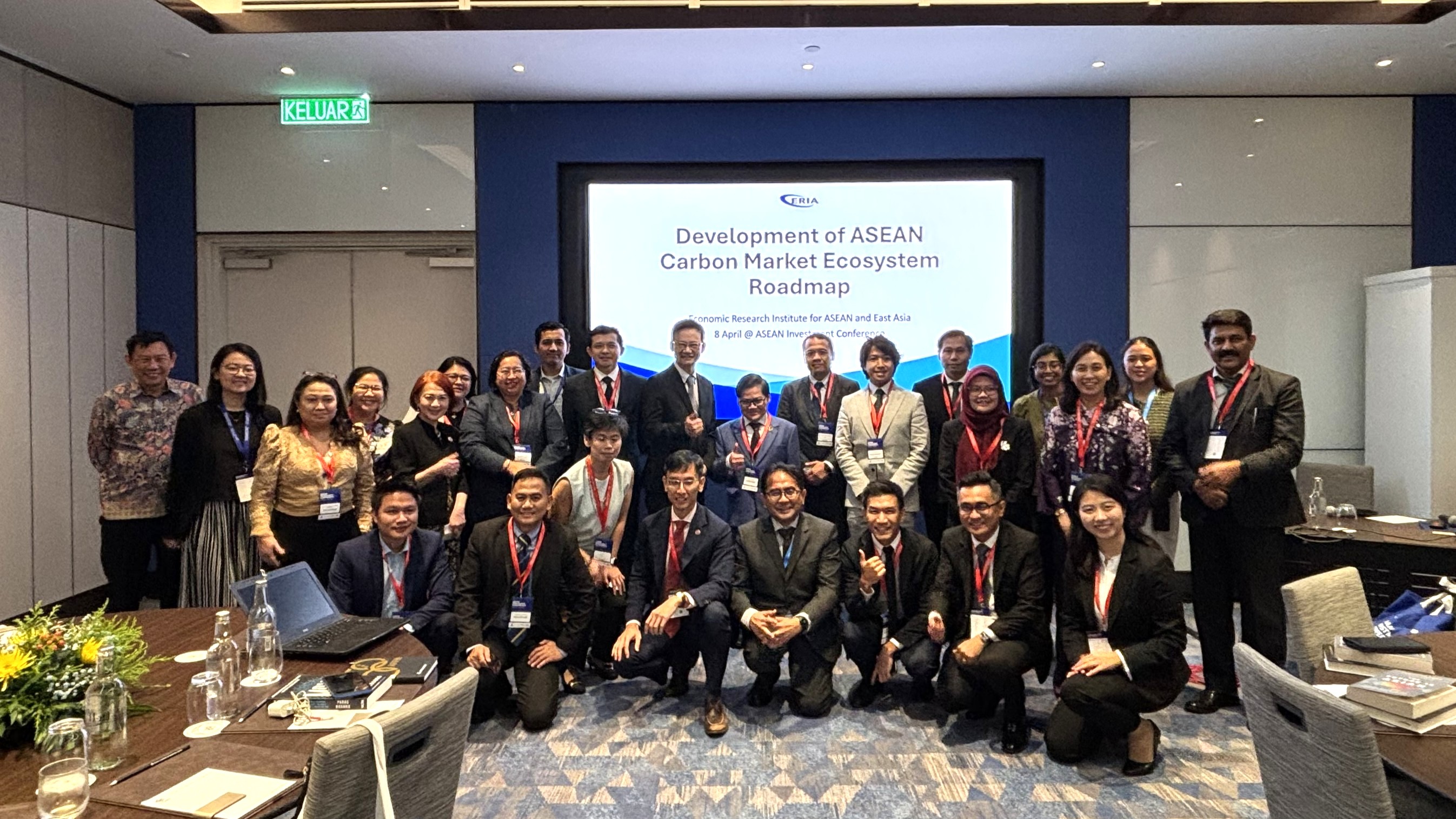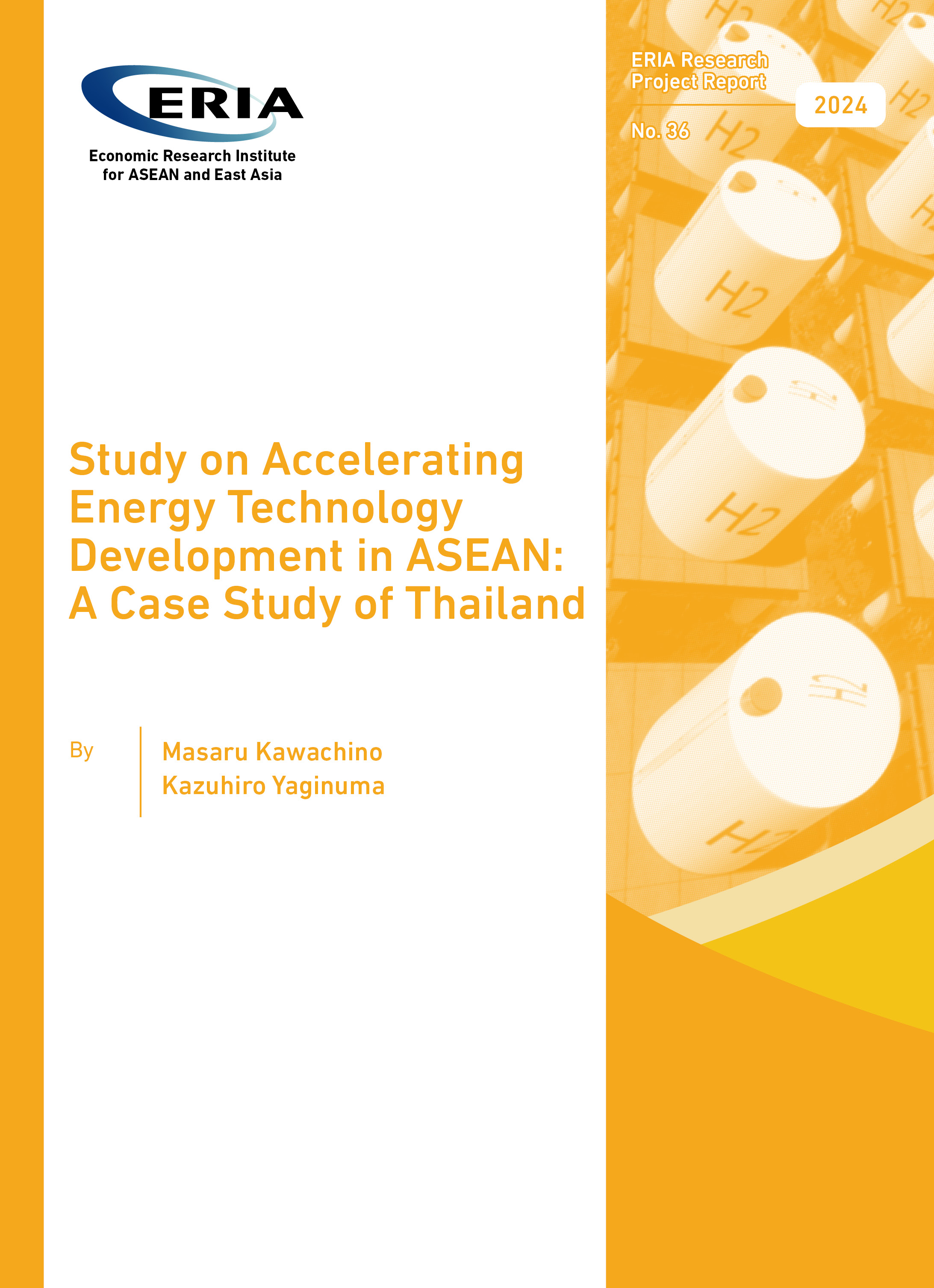ERIA Co-Organises Regional Symposium on Accelerating Digitalisation in Agriculture and Food Systems
Date:
30 September 2024Category:
NewsTopics:
Agricultural DevelopmentShare Article:
Print Article:
Vung Tau, 30 September - 1 October 2024: ERIA, in collaboration with the ASEAN Secretariat, Japan’s Ministry of Agriculture, Forestry and Fisheries (MAFF), and Viet Nam’s Ministry of Agriculture and Rural Development (MARD), co-organised the ‘ASEAN–Japan Symposium on Accelerating Digitalisation in Agriculture and Food Systems to Promote Sustainable Agricultural Development in the ASEAN Region.’ Held in Vung Tau, Viet Nam, the symposium gathered around 50 participants, including government officials from ASEAN Member States (AMS), Timor-Leste, and Japan, as well as representatives from businesses, academia, and international organisations like the OECD. The event provided a platform to explore the use of digital technologies, share best practices, and identify innovative solutions to promote digital transformation in agriculture and food systems.
In his opening remarks, Dr Tô Vit Châu, Deputy Director General of the International Cooperation Department at MARD, highlighted the symposium’s aim to bridge the digitalisation gap within ASEAN. He acknowledged ERIA's support for the region’s agricultural transformation and explained that Viet Nam had introduced the ‘Digital Transformation Plan for Agriculture and Rural Development (2022–2025)’ to prioritise the development of digital agriculture ecosystems, particularly through smart and precision agriculture.
Morii Hideyuki, Director and Senior Negotiator of the Bilateral Affairs Division at MAFF, Japan, addressed the audience by outlining Japan’s Midori Cooperation Plan, adopted during the 45th ASEAN Ministers on Agriculture and Forestry (AMAF) Meeting in 2023. This plan aims to enhance food security in ASEAN by fostering cooperation between Japan and ASEAN countries through the use of Japan’s technology and expertise to build resilient and sustainable agriculture and food systems in the region.
Masanori Kozono, ERIA’s Senior Policy Fellow, presented findings from an ERIA study conducted last year, which revealed that digital agriculture adoption in the ASEAN region remains limited, with significant disparities between countries. He emphasised the importance of collaboration, knowledge sharing, and robust policy frameworks to unlock the potential of digitalisation in advancing sustainable agricultural development. He also called on ASEAN to follow up on the ‘ASEAN Guidelines on Promoting the Utilisation of Digital Technologies for the Food and Agricultural Sector’ by developing a practical action plan to address the challenges and boost agriculture digitalisation across the region.
Day one of the symposium featured knowledge-sharing sessions with keynote speakers, panel discussions amongst businesses, and country presentations from AMS representatives. Dr Annelies Deuss, Senior Agricultural Policy Analyst at the OECD, highlighted the potential of Sanitary and Phytosanitary (SPS) electronic certification for agriculture, noting that e-certificates could increase agricultural trade value by as much as 70%. She also discussed the promising future role of remote audits in the sector.
Prof. Paul Teng, Managing Director & Dean at RSiS, Singapore, emphasised the need for more efficient and impactful initiatives, such as precision agriculture, to drive digital transformation. He identified the key drivers for increasing digital adoption in ASEAN agriculture: government support, private sector engagement, partnerships with local capacity builders, financing for farmers, and best practice sharing across the region.
Dr Venkatachalam Anbumozhi, ERIA’s Senior Research Fellow for Innovations, elaborated on the imperatives of digitalisation for achieving deep sustainability. He discussed AMS' readiness for the digital revolution in agriculture, stressing that digital transformation requires collective effort through instrumentation, integration, and intelligence. Dr Venkatachalam also highlighted the role of the ASEAN Digital Economy Framework (DEFA) in accelerating digital transformation, fostering greater cooperation, and paving the way for inclusive growth and sustainable development.
A panel discussion followed, featuring contributions from businesses and NGOs such as Olam Agri, Grow Asia, JAICAF, ADCA, SAGRI, IPSARD, and TCS Agrotech Ltd. These organisations shared their knowledge and best practices for promoting digital technologies in agriculture and food systems.
During the country presentations, each country reported best practices, proposed initiatives for the future, identified the challenges and opportunities for each country, and policy instruments to accelerate digital transformation. While some countries have already adopted advanced technologies like drones, remote sensing, and mobile phone applications, others are still in the early stages of digital transformation. Common obstacles include data availability, limited capacity to use modern technology, infrastructure limitations, high costs, and regulatory barriers.
The symposium concluded with a consensus to share information and explore investment opportunities, research collaborations, and new technologies to advance digital transformation in agriculture and food systems. The participants also agreed to pursue the development of a regional action programme to complement various cooperation projects aimed at unlocking the potential of digitalisation in promoting sustainable agricultural development.
On day two, participants embarked on a field trip to Trang Linh Company Limited, where they learned about hi-tech integrated smart agriculture, including herb production, livestock, and fisheries. They also visited Loc An Port to see the application of IT in ship navigation systems and the use of GPS data management systems for the sustainable harvest of fisheries along South Viet Nam's coastal areas.
This symposium forms part of ERIA's ongoing study on the ‘Benefits and Challenges of Digitalisation in Agriculture and Food Systems for Enhanced Resilience and Sustainability,’ supporting ASEAN’s efforts to accelerate digital transformation for sustainable economic growth.

.jpg)
.jpg)
.jpg)







